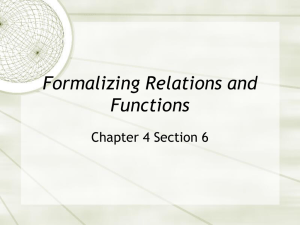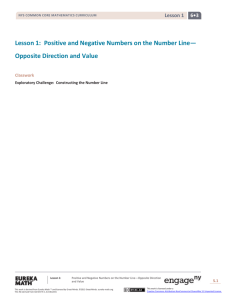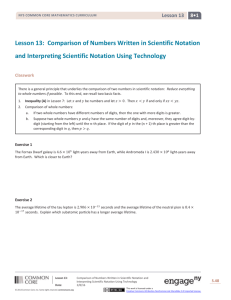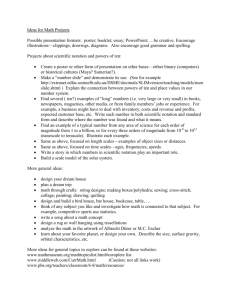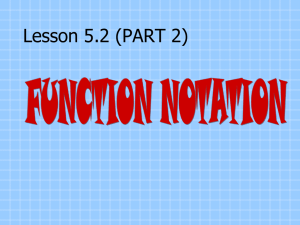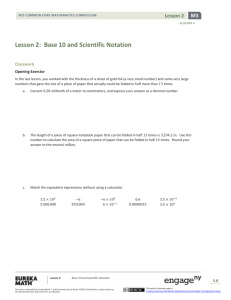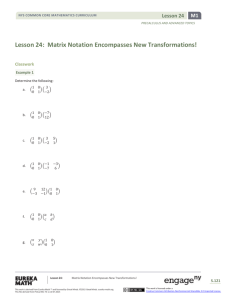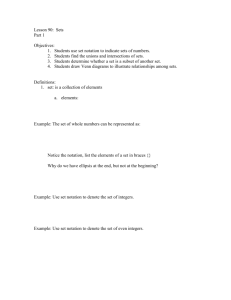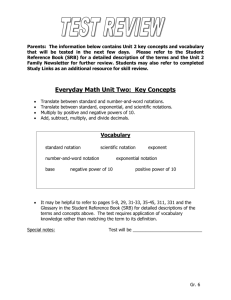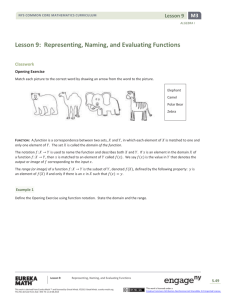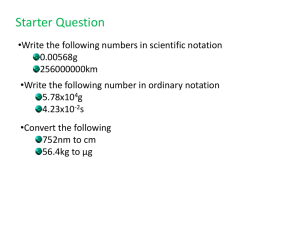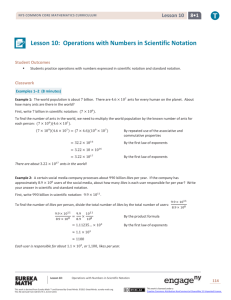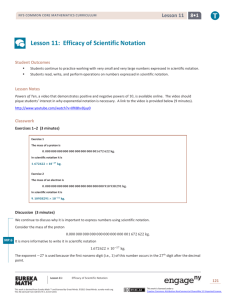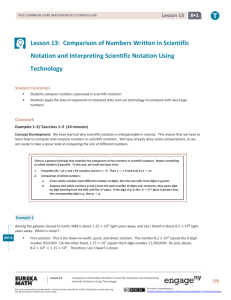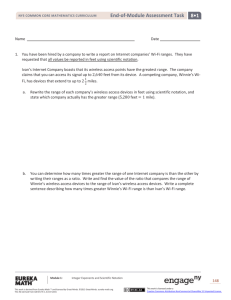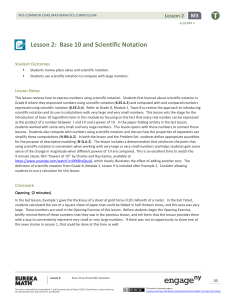Grade 8 Mathematics Module 1, Topic B, Lesson 13
advertisement
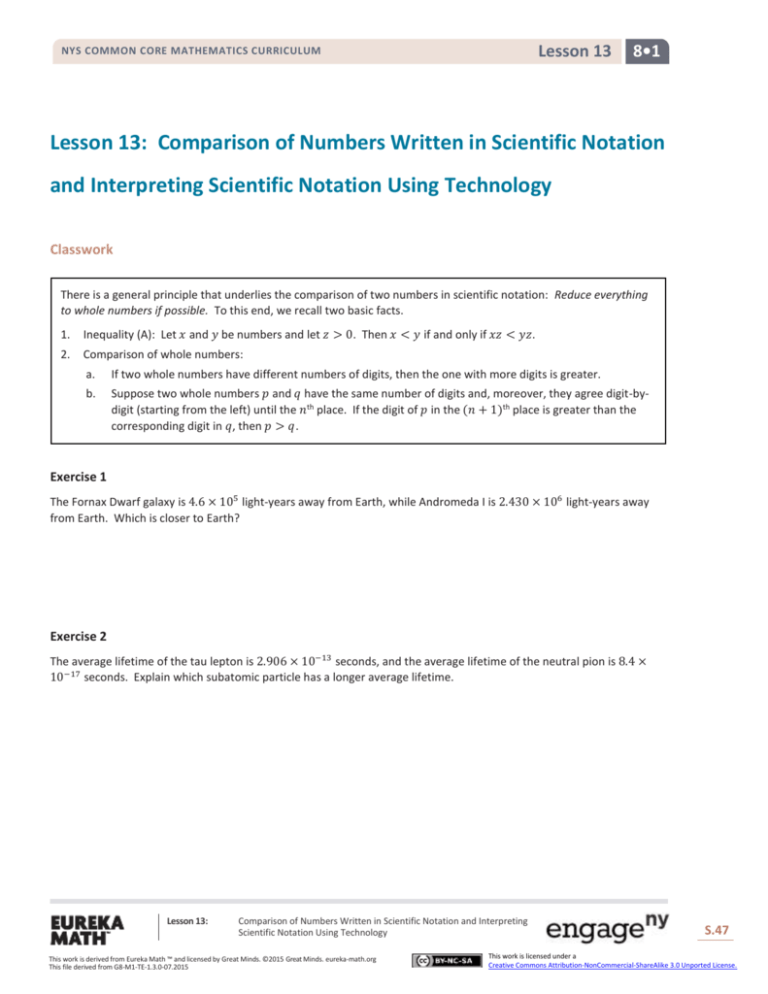
Lesson 13 NYS COMMON CORE MATHEMATICS CURRICULUM 8•1 Lesson 13: Comparison of Numbers Written in Scientific Notation and Interpreting Scientific Notation Using Technology Classwork There is a general principle that underlies the comparison of two numbers in scientific notation: Reduce everything to whole numbers if possible. To this end, we recall two basic facts. 1. Inequality (A): Let 𝑥 and 𝑦 be numbers and let 𝑧 > 0. Then 𝑥 < 𝑦 if and only if 𝑥𝑧 < 𝑦𝑧. 2. Comparison of whole numbers: a. If two whole numbers have different numbers of digits, then the one with more digits is greater. b. Suppose two whole numbers 𝑝 and 𝑞 have the same number of digits and, moreover, they agree digit-bydigit (starting from the left) until the 𝑛th place. If the digit of 𝑝 in the (𝑛 + 1)th place is greater than the corresponding digit in 𝑞, then 𝑝 > 𝑞. Exercise 1 The Fornax Dwarf galaxy is 4.6 × 105 light-years away from Earth, while Andromeda I is 2.430 × 106 light-years away from Earth. Which is closer to Earth? Exercise 2 The average lifetime of the tau lepton is 2.906 × 10−13 seconds, and the average lifetime of the neutral pion is 8.4 × 10−17 seconds. Explain which subatomic particle has a longer average lifetime. Lesson 13: Comparison of Numbers Written in Scientific Notation and Interpreting Scientific Notation Using Technology This work is derived from Eureka Math ™ and licensed by Great Minds. ©2015 Great Minds. eureka-math.org This file derived from G8-M1-TE-1.3.0-07.2015 S.47 This work is licensed under a Creative Commons Attribution-NonCommercial-ShareAlike 3.0 Unported License. Lesson 13 NYS COMMON CORE MATHEMATICS CURRICULUM 8•1 Exploratory Challenge 1/Exercise 3 THEOREM: Given two positive numbers in scientific notation, 𝑎 × 10𝑚 and 𝑏 × 10𝑛 , if 𝑚 < 𝑛, then 𝑎 × 10𝑚 < 𝑏 × 10𝑛 . Prove the theorem. Exercise 4 Compare 9.3 × 1028 and 9.2879 × 1028 . Exercise 5 Chris said that 5.3 × 1041 < 5.301 × 1041 because 5.3 has fewer digits than 5.301. Show that even though his answer is correct, his reasoning is flawed. Show him an example to illustrate that his reasoning would result in an incorrect answer. Explain. Lesson 13: Comparison of Numbers Written in Scientific Notation and Interpreting Scientific Notation Using Technology This work is derived from Eureka Math ™ and licensed by Great Minds. ©2015 Great Minds. eureka-math.org This file derived from G8-M1-TE-1.3.0-07.2015 S.48 This work is licensed under a Creative Commons Attribution-NonCommercial-ShareAlike 3.0 Unported License. Lesson 13 NYS COMMON CORE MATHEMATICS CURRICULUM 8•1 Exploratory Challenge 2/Exercise 6 You have been asked to determine the exact number of Google searches that are made each year. The only information you are provided is that there are 35,939,938,877 searches performed each week. Assuming the exact same number of searches are performed each week for the 52 weeks in a year, how many total searches will have been performed in one year? Your calculator does not display enough digits to get the exact answer. Therefore, you must break down the problem into smaller parts. Remember, you cannot approximate an answer because you need to find an exact answer. Use the screen shots below to help you reach your answer. Lesson 13: Comparison of Numbers Written in Scientific Notation and Interpreting Scientific Notation Using Technology This work is derived from Eureka Math ™ and licensed by Great Minds. ©2015 Great Minds. eureka-math.org This file derived from G8-M1-TE-1.3.0-07.2015 S.49 This work is licensed under a Creative Commons Attribution-NonCommercial-ShareAlike 3.0 Unported License. Lesson 13 NYS COMMON CORE MATHEMATICS CURRICULUM 8•1 Yahoo! is another popular search engine. Yahoo! receives requests for 1,792,671,355 searches each month. Assuming the same number of searches are performed each month, how many searches are performed on Yahoo! each year? Use the screen shots below to help determine the answer. Lesson 13: Comparison of Numbers Written in Scientific Notation and Interpreting Scientific Notation Using Technology This work is derived from Eureka Math ™ and licensed by Great Minds. ©2015 Great Minds. eureka-math.org This file derived from G8-M1-TE-1.3.0-07.2015 S.50 This work is licensed under a Creative Commons Attribution-NonCommercial-ShareAlike 3.0 Unported License. Lesson 13 NYS COMMON CORE MATHEMATICS CURRICULUM 8•1 Problem Set 1. Write out a detailed proof of the fact that, given two numbers in scientific notation, 𝑎 × 10𝑛 and 𝑏 × 10𝑛 , 𝑎 < 𝑏, if and only if 𝑎 × 10𝑛 < 𝑏 × 10𝑛 . a. Let 𝐴 and 𝐵 be two positive numbers, with no restrictions on their size. Is it true that 𝐴 × 10−5 < 𝐵 × 105 ? b. Now, if 𝐴 × 10−5 and 𝐵 × 105 are written in scientific notation, is it true that 𝐴 × 10−5 < 𝐵 × 105 ? Explain. 2. The mass of a neutron is approximately 1.674927 × 10−27 kg. Recall that the mass of a proton is 1.672622 × 10−27 kg. Explain which is heavier. 3. The average lifetime of the Z boson is approximately 3 × 10−25 seconds, and the average lifetime of a neutral rho meson is approximately 4.5 × 10−24 seconds. a. Without using the theorem from today’s lesson, explain why the neutral rho meson has a longer average lifetime. b. Approximately how much longer is the lifetime of a neutral rho meson than a Z boson? Lesson 13: Comparison of Numbers Written in Scientific Notation and Interpreting Scientific Notation Using Technology This work is derived from Eureka Math ™ and licensed by Great Minds. ©2015 Great Minds. eureka-math.org This file derived from G8-M1-TE-1.3.0-07.2015 S.51 This work is licensed under a Creative Commons Attribution-NonCommercial-ShareAlike 3.0 Unported License.
